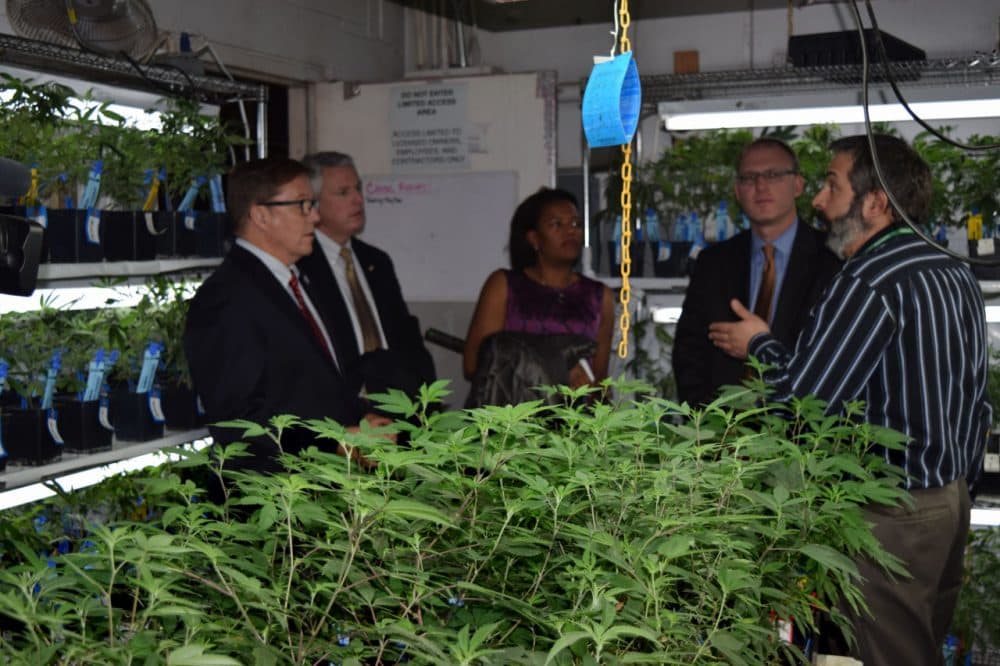Advertisement
New Bills Seek To Regulate Marijuana In Mass.
Resume
It's been almost exactly three months since Massachusetts overwhelmingly voted to legalize recreational marijuana in the state. Now, there are fifteen new bills pending on Beacon Hill that could significantly change what voters thought they were approving back in November.
Guest
Jason Lewis, Massachusetts state senator, chair of the Public Health Committee and of the Special Senate Committee on Marijuana. He tweets @SenJasonLewis.
Interview Highlights
On why he's proposing the bills
"We are committed to implementing the will of the voters and in fact, as of December 15, it's now legal to possess and to use and to home grow marijuana in limited quantities.
"What the next step in the process is, to put in place a legal market in order to allow the sale and the purchase of marijuana. And that's a very complicated undertaking and that's what we're committed to moving forward with next. So the legislation that I filed in the new session and that other senators and representatives have filed as well, basically seeks to do three things: It seeks to fill in gaps which were not addressed by the ballot law; second, it seeks to clarify areas in the ballot law that there's some confusion around; ... and third, it seeks to strengthen some areas in the ballot law where there are significant concerns that we're hearing from various stakeholders."
On if he's really implementing the will of the voters
"One of the bills addresses the issue of drunk driving and how are we gonna deal with likely increases in people driving under the influence. Another bill deals with creating a research program and data collection. Another bill deals with the kinds of packaging and labeling requirements to ensure that these products are used safely."
On the bills that reduce how much people can possess and how much they can home grow
"In terms of possession, we have to remember marijuana remains illegal under federal law — it's a schedule 1 drug. So even with legalization there's many limits on what you can and can't do. The most significant of those is that you can possess up to 1 ounce and an ounce of marijuana is about equivalent to 50 joints, so it's not a very small amount.
"In this ballot question, there was language to allow up to 10 ounces at home and frankly, I think that was reflecting what we have for the medical marijuana program. But recreational marijuana is not the same as medical marijuana and in almost every other state, there's no allowance for possessing additional amounts of marijuana in your own home. [The bill] reflects what's generally true across the country and to reflect the fact that we want to allow people to possess reasonable quantities but not more than that."
On why the legislature feels compelled to make these changes
(Some listener variations on the question: "The people voted to pass the cannabis referendum... why do you feel compelled to undermine the will of the people?" "Why do you feel it necessary to contravene the will of the majority of Mass. voters?" "How do you square your recent vote to raise your salary with your obstinate attitude toward Question 4?" "If you work for the people, why do you approach this as if you work for yourself?")
"I've certainly heard the same feedback from my own constituents as well as others and I listen very carefully to that.
"At the same time I've also heard feedback from public health experts, from those who work in the addiction community and treat substance abuse, from mayors and municipal officials, from police officers and businesses, and others who are very concerned about exactly how the law is implemented --and making sure that yes, we absolutely have to move forward with legalization as quickly and efficiently as we can in terms of a legal market. But let's do that thoughtfully, let's do that safely, let's prioritize public health. And frankly, let's learn from what's happened in Colorado, Washington, and other states. And that's all that I'm seeking to do with the bills that I've filed."
On the idea of letting legalization unfold as written in Question 4 and then make the changes that emerge as being necessary
"First of all, all of these bills that I've filed — and I think there's 75 in total that have been filed in the new session — they're all gonna get debated. Nothing is worked out yet. There'll be public hearings. I'm hoping they will be all around the state so that it'll make it accessible and convenient for people to attend and weigh in.
"I don't subscribe to the school of thought that says let's let things happen, let's let the problems occur when we know what's likely to happen when we look at other states.
"Colorado, for example, has passed more than 20 bills since their legalization was approved at the ballot ... They've had a lot of challenges that they've had to deal with and they've learned a lot of lessons along the way. And I think that it would behoove us to take advantage of all that and let's do this right in the first place.
"Why would we want to go forward knowing that we're gonna have a whole series of problems and frankly, why would we not want to focus on public health and prevention efforts? Why would we not wanna do everything we can? It's fine if adults wanna make the decision to consume cannabis, but I think we wanna do everything possible to keep it out of the hands of kids and teenagers and to not increase rates of use among our teens as well as keeping it off of our roads."
On the delay of retail shops opening, passed in informal session
"We would've preferred to have done that in a formal session when all the lawmakers were present, but we really needed to do that before the end of the year. Because otherwise we would've been actually implementing the law and building a whole regulatory structure at the same time we were making changes to it."
On his opposition to Question 4 and critics who see the bills as attempts to muddy the process
"... The legislature is very committed to moving forward quickly. We've just created a brand new marijuana committee it's the first time that's ever existed. The reason for that is to put all of this in one place, because there's public safety issues, public health issues, revenue issues, there's municipal issues which ordinarily would be handled by a whole variety of different committees ...
"That process is gonna get underway over the next few months and Governor Baker has said already he'd like to have a final bill on his desk by the spring. So that's the goal we're working towards.
"We're not looking to create confusion or uncertainty anymore than already exists or to slow down the market. But again, we really, I think, owe it to everybody in the state, people who voted for this and people who didn't, that we do this right and we do it safely."
On his legislation to limit home growing
"... Allowing up to twelve plants is actually a pretty considerable amount of marijuana. You can argue over that and how many strains you can produce but if you know what you're doing that's a very significant amount of marijuana. That's more than is allowed in virtually any other state. Washington state doesn't allow any home growing for that matter. Most states allow something closer to six.
"We see problems in Colorado with a very large black market — a lot of that is fed by home growing which is not easy to enforce. And I think we wanna get off in Massachusetts in the right place."
On allowing cities and towns to ban the sale of marijuana without special election or local referendum
"I just met with the city of Somerville just last week. And that's a city where they are rolling out medical marijuana now. They're gonna be having I think up to four dispensaries in the city and the residents of Somerville strongly support that. And they fully expect that they will have a recreational marijuana facilities in the city as well, retail outlets, maybe grow facilities.
"Under the ballot question, where those medical marijuana facilities are located, they would be required to allow recreational in the same location. Some of those medical marijuana dispensaries ... are located right near schools because they're treating them like pharmacies because it's medical marijuana. So they're very concerned that they would be forced to allow retail pot shops to potentially also be in a very close proximity to a school. And that's the kind of thing they want to have control over.
"... And I'm hearing loud and clear from municipal officials that that's the way they like to move forward."
On bill to allow people arrested in connection with 1 oz. of possession of marijuana to possibly expunge that arrest from their record
"I'm concerned about the war on drugs that we've been fighting for decades and how many people have been harmed by that and how many families have been hurt by that. What I' proposing in this legislation is you could essentially expunge your record if you have a conviction for possession of up to an ounce which is what's now legal.... That's an example of something that law enforcement may push back on."
This segment aired on February 7, 2017.

